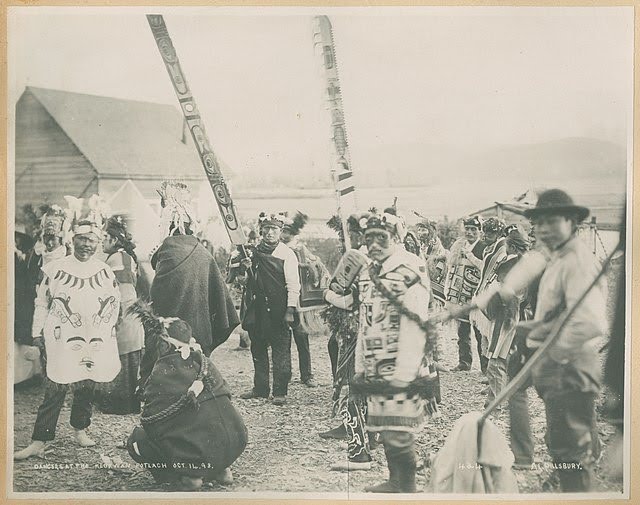

 Dancers at Klukwan Potlatch ceremony, Alaska, October 14, 1898. Photo by Pillsbury, A. C. In the public domain.
Dancers at Klukwan Potlatch ceremony, Alaska, October 14, 1898. Photo by Pillsbury, A. C. In the public domain.
Introducing another of our accomplished authors, we have Robert Hansell’s “Indigenous Food Sovereignty: A Thematic & Case Study Literature Review.” We are thrilled to publish a piece that resonates so profoundly with our own work at CWIS, which stresses the importance of traditional medicine and food as methods of sustaining our bodies, spirits, and cultural practices. His work is particularly compelling in its transregional comparative approach to the topic. Reaching from Palestine to the Pacific Northwest, Hansell draws parallels among communities, exploring Indigenous communities’ many diverse approaches to decolonizing food systems.
Not to be confused with food security, food sovereignty refers to a people’s right to define the methods of production and consumption of food. In his piece, Hansell explores and complicates the manifold meanings of the term, as well as its distinct relevance within the indigenous context. The common strand running through the piece is self-determination and food systems as a means of achieving that aim. As Hansell mentions in his video, food systems lay at the intersection of land rights, governance, and healthcare.
Hear from Hansell himself speak on the intentions behind his piece:
Abstract
Indigenous peoples have practiced food systems intertwined with the plants, animals, lands, and waters around them for thousands of years. These connections have frequently been severed by colonialism, producing devastating effects on Indigenous health, culture, and sovereignty. In the face of this devastation, the reflourishing of Indigenous food sovereignty constitutes a critical form of resistance. This paper provides a broad review of the academic literature on Indigenous food sovereignty, analyzing themes and case studies. This paper argues that 5 themes (health, law and the state, social perceptions of food, gender, and free trade) reflect helpful entry points for understanding this multidimensional topic. The case studies detail important aspects of food sovereignty, such as data ownership, anticolonial resistance, relationality, and seed saving. First, background on traditional food systems is given, followed by an exploration of food sovereignty, Indigenous food sovereignty, and food security in common literature. Five themes are used to ground Indigenous food sovereignty in key debates and challenges. Using the five case studies, this review aims to give the reader a sense of the inherently political nature of food systems in the experiences of Indigenous peoples by touching on a wide set of illustrative texts, examples, and cases.
About the author:

Robert Hansell is an International Relations (MA) student at the University of Edinburgh. They focus on critical approaches to International Relations, with research interests in race, colonialism/settler colonialism, gender, and critical political economy. At the Center for World Indigenous Studies, they have continued a focus on the politics of health, the body, and colonialism through research on Indigenous food sovereignty. Robert was the recipient of the 2024 Simon Gray Prize for most distinguished work in Theories of International Relations for research on the coloniality of international law in Palestine.
Get full access to this article and the latest issue of the Fourth World Journal.
The library is dedicated to the memory of Secwepemc Chief George Manuel (1921-1989), to the nations of the Fourth World and to the elders and generations to come.
access here